Business Law Assignment - Contract Law and Director's Liabilities
VerifiedAdded on 2022/11/04
|8
|2305
|275
Homework Assignment
AI Summary
This Business Law assignment presents two distinct scenarios. Part A examines a contract law issue, specifically whether SOO Burgers is obligated to provide cars to individuals based on an advertisement offering a reward. It analyzes the concepts of 'invitation to offer,' 'offer,' and 'acceptance,' referencing cases like Partridge v Crittenden, Carlill v Carbolic Smoke Ball Company, Byrne v Van Tienhoven & Co., and Dickinson v Dodds. The application section assesses the validity of offers, revocation, and acceptance in relation to the individuals involved. Part B focuses on corporate law, evaluating whether Mercedes and Gregg, as directors, breached their duties under the Corporations Act. It explores director's duties of care, diligence, and preventing insolvent trading, citing sections 180, 588G, 588GA, and 181 of the Corporations Act, as well as relevant case law such as ASIC v Rich, Tourprint v Bott, and Bell Group Ltd v Westpac Banking Corp. The analysis considers the 'business judgment rule' and the 'safe harbor' defense. The assignment concludes with determinations of liability in both scenarios.
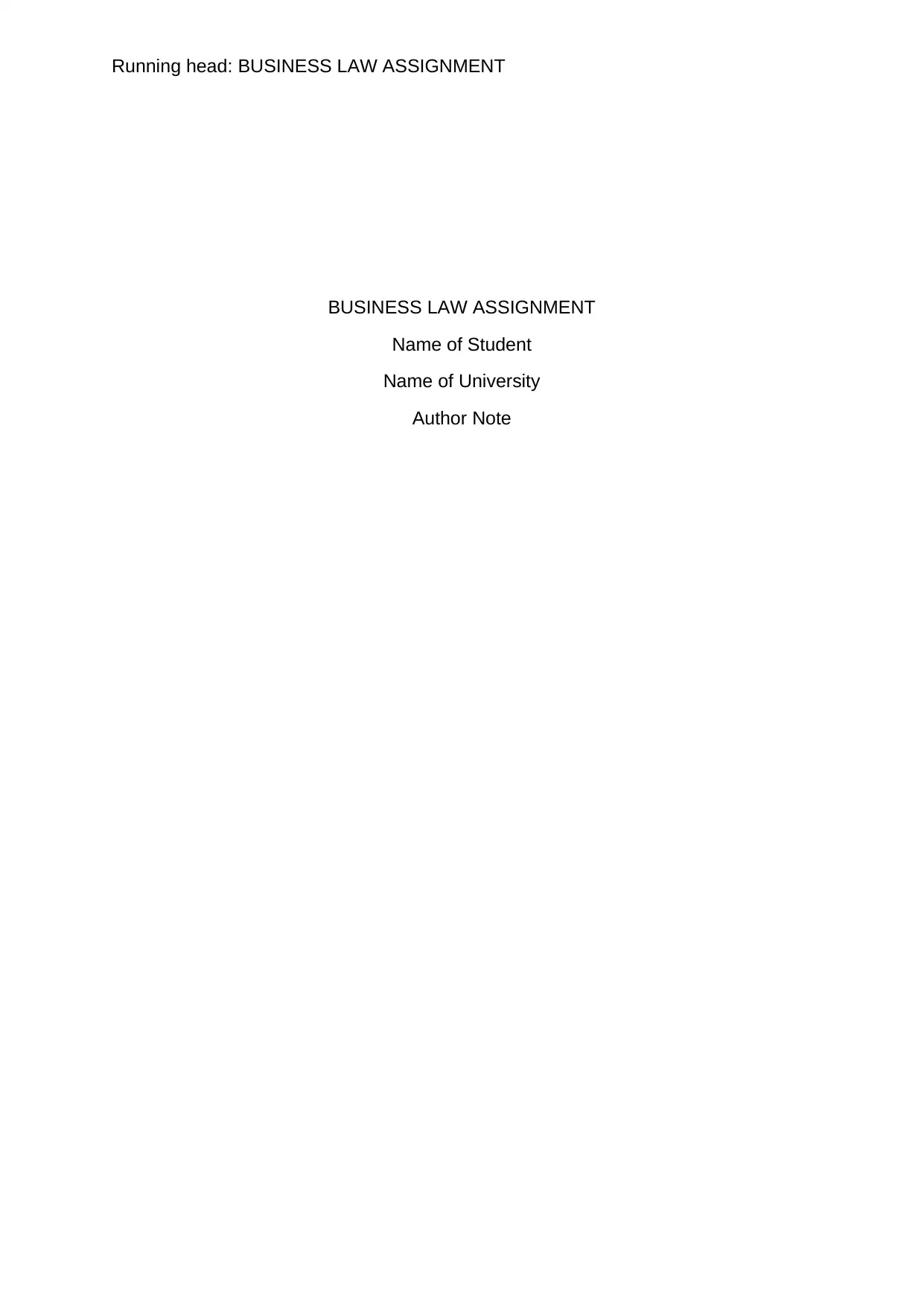
Running head: BUSINESS LAW ASSIGNMENT
BUSINESS LAW ASSIGNMENT
Name of Student
Name of University
Author Note
BUSINESS LAW ASSIGNMENT
Name of Student
Name of University
Author Note
Paraphrase This Document
Need a fresh take? Get an instant paraphrase of this document with our AI Paraphraser
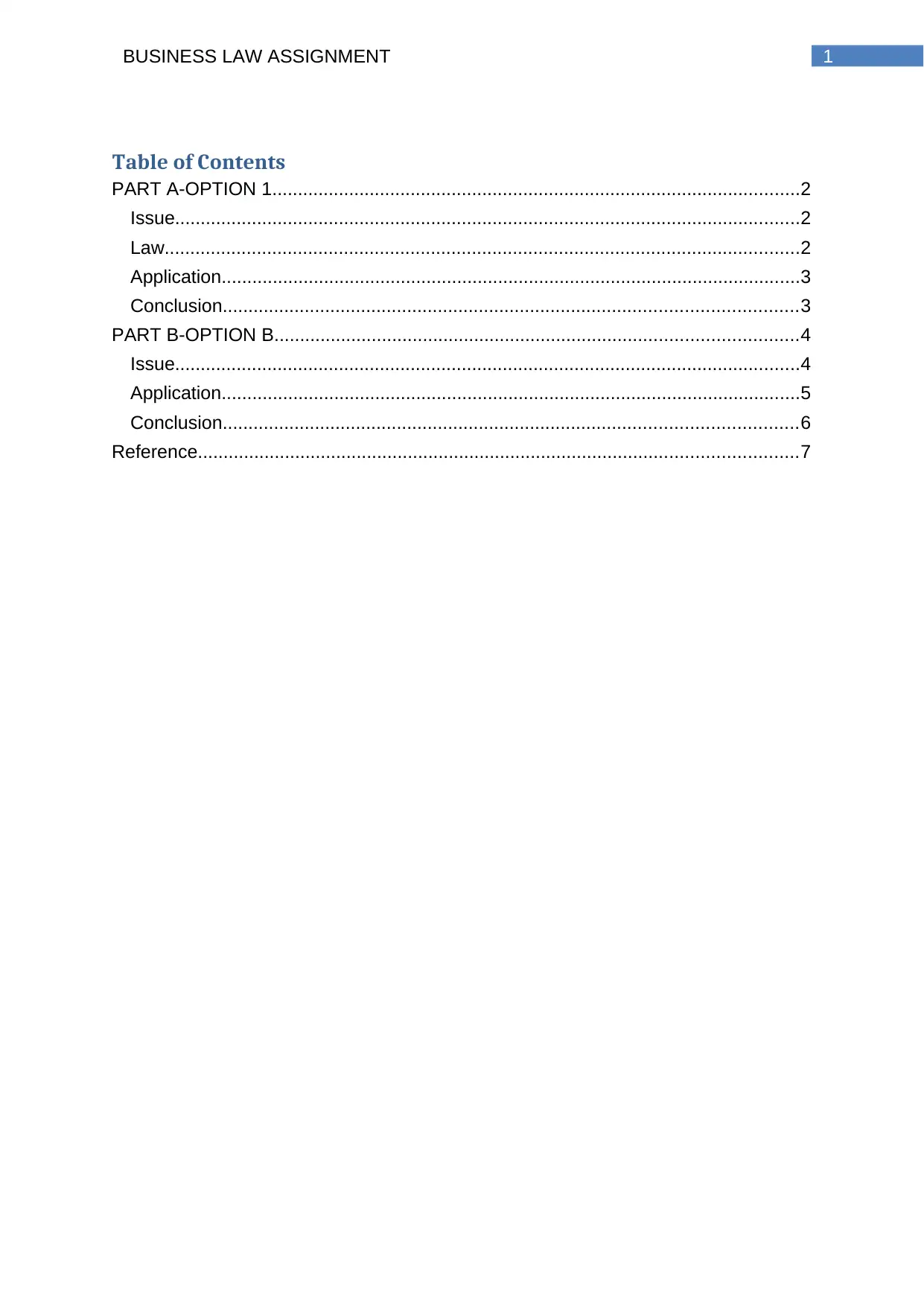
1BUSINESS LAW ASSIGNMENT
Table of Contents
PART A-OPTION 1.......................................................................................................2
Issue..........................................................................................................................2
Law............................................................................................................................2
Application.................................................................................................................3
Conclusion................................................................................................................3
PART B-OPTION B......................................................................................................4
Issue..........................................................................................................................4
Application.................................................................................................................5
Conclusion................................................................................................................6
Reference.....................................................................................................................7
Table of Contents
PART A-OPTION 1.......................................................................................................2
Issue..........................................................................................................................2
Law............................................................................................................................2
Application.................................................................................................................3
Conclusion................................................................................................................3
PART B-OPTION B......................................................................................................4
Issue..........................................................................................................................4
Application.................................................................................................................5
Conclusion................................................................................................................6
Reference.....................................................................................................................7
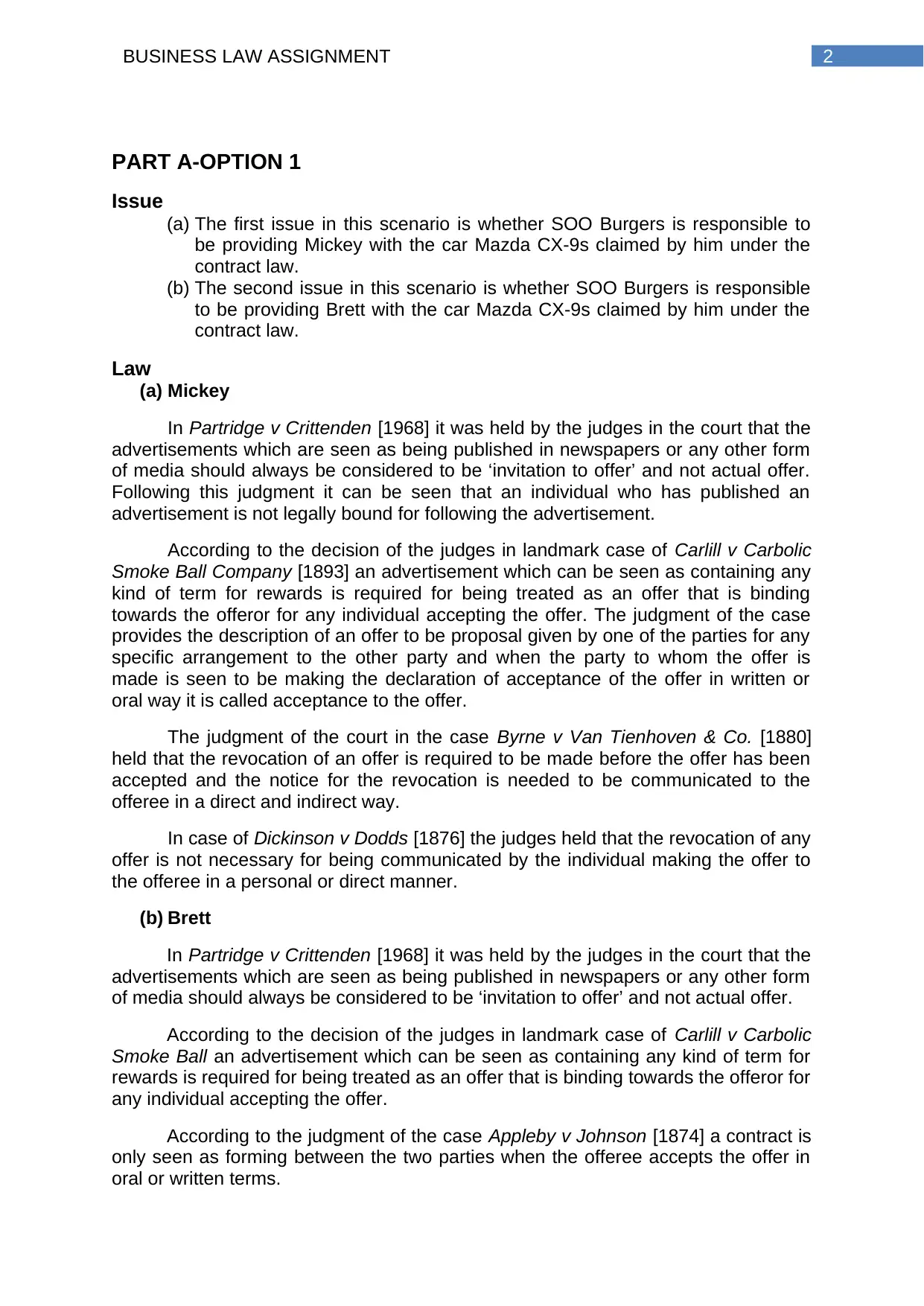
2BUSINESS LAW ASSIGNMENT
PART A-OPTION 1
Issue
(a) The first issue in this scenario is whether SOO Burgers is responsible to
be providing Mickey with the car Mazda CX-9s claimed by him under the
contract law.
(b) The second issue in this scenario is whether SOO Burgers is responsible
to be providing Brett with the car Mazda CX-9s claimed by him under the
contract law.
Law
(a) Mickey
In Partridge v Crittenden [1968] it was held by the judges in the court that the
advertisements which are seen as being published in newspapers or any other form
of media should always be considered to be ‘invitation to offer’ and not actual offer.
Following this judgment it can be seen that an individual who has published an
advertisement is not legally bound for following the advertisement.
According to the decision of the judges in landmark case of Carlill v Carbolic
Smoke Ball Company [1893] an advertisement which can be seen as containing any
kind of term for rewards is required for being treated as an offer that is binding
towards the offeror for any individual accepting the offer. The judgment of the case
provides the description of an offer to be proposal given by one of the parties for any
specific arrangement to the other party and when the party to whom the offer is
made is seen to be making the declaration of acceptance of the offer in written or
oral way it is called acceptance to the offer.
The judgment of the court in the case Byrne v Van Tienhoven & Co. [1880]
held that the revocation of an offer is required to be made before the offer has been
accepted and the notice for the revocation is needed to be communicated to the
offeree in a direct and indirect way.
In case of Dickinson v Dodds [1876] the judges held that the revocation of any
offer is not necessary for being communicated by the individual making the offer to
the offeree in a personal or direct manner.
(b) Brett
In Partridge v Crittenden [1968] it was held by the judges in the court that the
advertisements which are seen as being published in newspapers or any other form
of media should always be considered to be ‘invitation to offer’ and not actual offer.
According to the decision of the judges in landmark case of Carlill v Carbolic
Smoke Ball an advertisement which can be seen as containing any kind of term for
rewards is required for being treated as an offer that is binding towards the offeror for
any individual accepting the offer.
According to the judgment of the case Appleby v Johnson [1874] a contract is
only seen as forming between the two parties when the offeree accepts the offer in
oral or written terms.
PART A-OPTION 1
Issue
(a) The first issue in this scenario is whether SOO Burgers is responsible to
be providing Mickey with the car Mazda CX-9s claimed by him under the
contract law.
(b) The second issue in this scenario is whether SOO Burgers is responsible
to be providing Brett with the car Mazda CX-9s claimed by him under the
contract law.
Law
(a) Mickey
In Partridge v Crittenden [1968] it was held by the judges in the court that the
advertisements which are seen as being published in newspapers or any other form
of media should always be considered to be ‘invitation to offer’ and not actual offer.
Following this judgment it can be seen that an individual who has published an
advertisement is not legally bound for following the advertisement.
According to the decision of the judges in landmark case of Carlill v Carbolic
Smoke Ball Company [1893] an advertisement which can be seen as containing any
kind of term for rewards is required for being treated as an offer that is binding
towards the offeror for any individual accepting the offer. The judgment of the case
provides the description of an offer to be proposal given by one of the parties for any
specific arrangement to the other party and when the party to whom the offer is
made is seen to be making the declaration of acceptance of the offer in written or
oral way it is called acceptance to the offer.
The judgment of the court in the case Byrne v Van Tienhoven & Co. [1880]
held that the revocation of an offer is required to be made before the offer has been
accepted and the notice for the revocation is needed to be communicated to the
offeree in a direct and indirect way.
In case of Dickinson v Dodds [1876] the judges held that the revocation of any
offer is not necessary for being communicated by the individual making the offer to
the offeree in a personal or direct manner.
(b) Brett
In Partridge v Crittenden [1968] it was held by the judges in the court that the
advertisements which are seen as being published in newspapers or any other form
of media should always be considered to be ‘invitation to offer’ and not actual offer.
According to the decision of the judges in landmark case of Carlill v Carbolic
Smoke Ball an advertisement which can be seen as containing any kind of term for
rewards is required for being treated as an offer that is binding towards the offeror for
any individual accepting the offer.
According to the judgment of the case Appleby v Johnson [1874] a contract is
only seen as forming between the two parties when the offeree accepts the offer in
oral or written terms.
⊘ This is a preview!⊘
Do you want full access?
Subscribe today to unlock all pages.

Trusted by 1+ million students worldwide
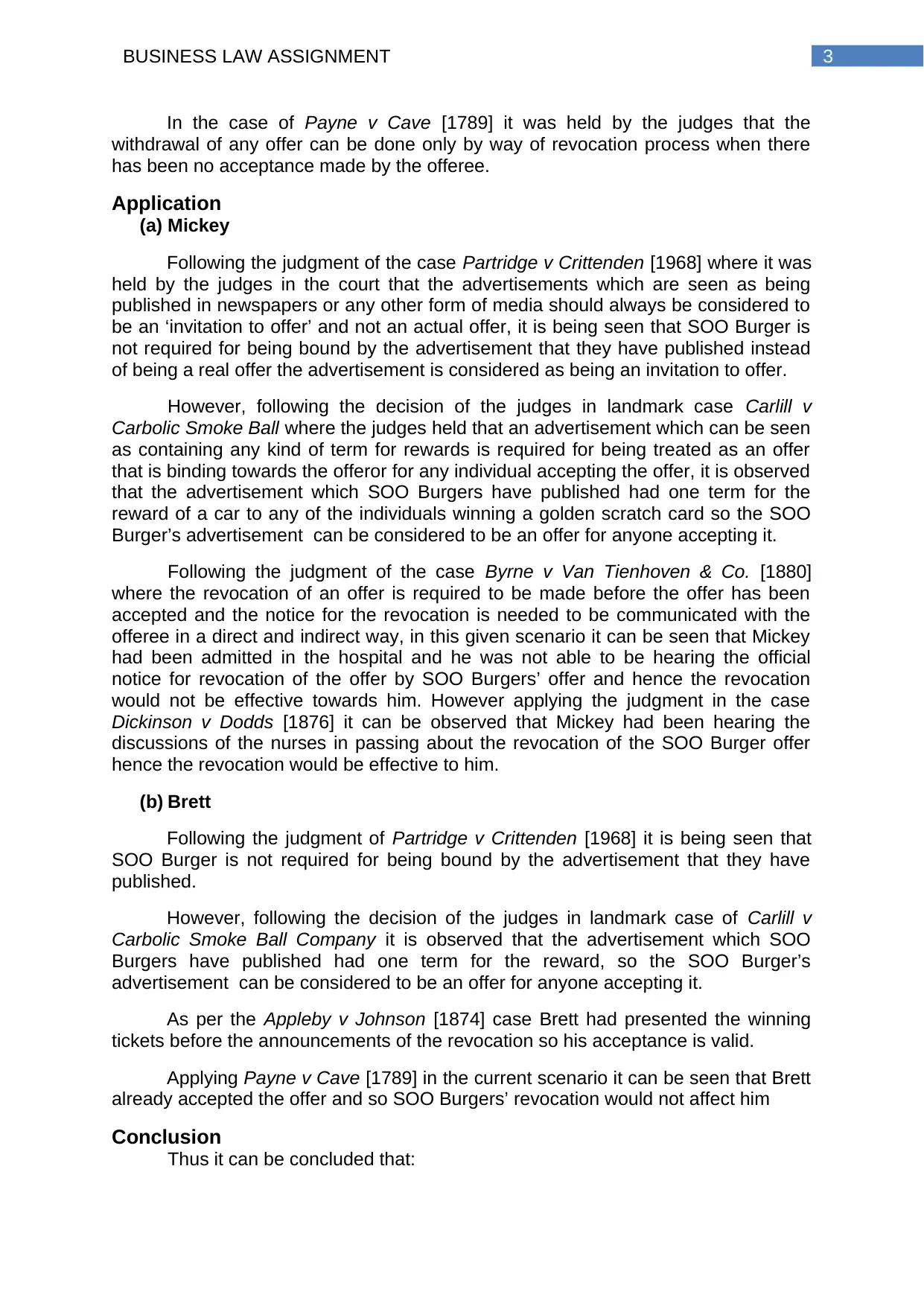
3BUSINESS LAW ASSIGNMENT
In the case of Payne v Cave [1789] it was held by the judges that the
withdrawal of any offer can be done only by way of revocation process when there
has been no acceptance made by the offeree.
Application
(a) Mickey
Following the judgment of the case Partridge v Crittenden [1968] where it was
held by the judges in the court that the advertisements which are seen as being
published in newspapers or any other form of media should always be considered to
be an ‘invitation to offer’ and not an actual offer, it is being seen that SOO Burger is
not required for being bound by the advertisement that they have published instead
of being a real offer the advertisement is considered as being an invitation to offer.
However, following the decision of the judges in landmark case Carlill v
Carbolic Smoke Ball where the judges held that an advertisement which can be seen
as containing any kind of term for rewards is required for being treated as an offer
that is binding towards the offeror for any individual accepting the offer, it is observed
that the advertisement which SOO Burgers have published had one term for the
reward of a car to any of the individuals winning a golden scratch card so the SOO
Burger’s advertisement can be considered to be an offer for anyone accepting it.
Following the judgment of the case Byrne v Van Tienhoven & Co. [1880]
where the revocation of an offer is required to be made before the offer has been
accepted and the notice for the revocation is needed to be communicated with the
offeree in a direct and indirect way, in this given scenario it can be seen that Mickey
had been admitted in the hospital and he was not able to be hearing the official
notice for revocation of the offer by SOO Burgers’ offer and hence the revocation
would not be effective towards him. However applying the judgment in the case
Dickinson v Dodds [1876] it can be observed that Mickey had been hearing the
discussions of the nurses in passing about the revocation of the SOO Burger offer
hence the revocation would be effective to him.
(b) Brett
Following the judgment of Partridge v Crittenden [1968] it is being seen that
SOO Burger is not required for being bound by the advertisement that they have
published.
However, following the decision of the judges in landmark case of Carlill v
Carbolic Smoke Ball Company it is observed that the advertisement which SOO
Burgers have published had one term for the reward, so the SOO Burger’s
advertisement can be considered to be an offer for anyone accepting it.
As per the Appleby v Johnson [1874] case Brett had presented the winning
tickets before the announcements of the revocation so his acceptance is valid.
Applying Payne v Cave [1789] in the current scenario it can be seen that Brett
already accepted the offer and so SOO Burgers’ revocation would not affect him
Conclusion
Thus it can be concluded that:
In the case of Payne v Cave [1789] it was held by the judges that the
withdrawal of any offer can be done only by way of revocation process when there
has been no acceptance made by the offeree.
Application
(a) Mickey
Following the judgment of the case Partridge v Crittenden [1968] where it was
held by the judges in the court that the advertisements which are seen as being
published in newspapers or any other form of media should always be considered to
be an ‘invitation to offer’ and not an actual offer, it is being seen that SOO Burger is
not required for being bound by the advertisement that they have published instead
of being a real offer the advertisement is considered as being an invitation to offer.
However, following the decision of the judges in landmark case Carlill v
Carbolic Smoke Ball where the judges held that an advertisement which can be seen
as containing any kind of term for rewards is required for being treated as an offer
that is binding towards the offeror for any individual accepting the offer, it is observed
that the advertisement which SOO Burgers have published had one term for the
reward of a car to any of the individuals winning a golden scratch card so the SOO
Burger’s advertisement can be considered to be an offer for anyone accepting it.
Following the judgment of the case Byrne v Van Tienhoven & Co. [1880]
where the revocation of an offer is required to be made before the offer has been
accepted and the notice for the revocation is needed to be communicated with the
offeree in a direct and indirect way, in this given scenario it can be seen that Mickey
had been admitted in the hospital and he was not able to be hearing the official
notice for revocation of the offer by SOO Burgers’ offer and hence the revocation
would not be effective towards him. However applying the judgment in the case
Dickinson v Dodds [1876] it can be observed that Mickey had been hearing the
discussions of the nurses in passing about the revocation of the SOO Burger offer
hence the revocation would be effective to him.
(b) Brett
Following the judgment of Partridge v Crittenden [1968] it is being seen that
SOO Burger is not required for being bound by the advertisement that they have
published.
However, following the decision of the judges in landmark case of Carlill v
Carbolic Smoke Ball Company it is observed that the advertisement which SOO
Burgers have published had one term for the reward, so the SOO Burger’s
advertisement can be considered to be an offer for anyone accepting it.
As per the Appleby v Johnson [1874] case Brett had presented the winning
tickets before the announcements of the revocation so his acceptance is valid.
Applying Payne v Cave [1789] in the current scenario it can be seen that Brett
already accepted the offer and so SOO Burgers’ revocation would not affect him
Conclusion
Thus it can be concluded that:
Paraphrase This Document
Need a fresh take? Get an instant paraphrase of this document with our AI Paraphraser
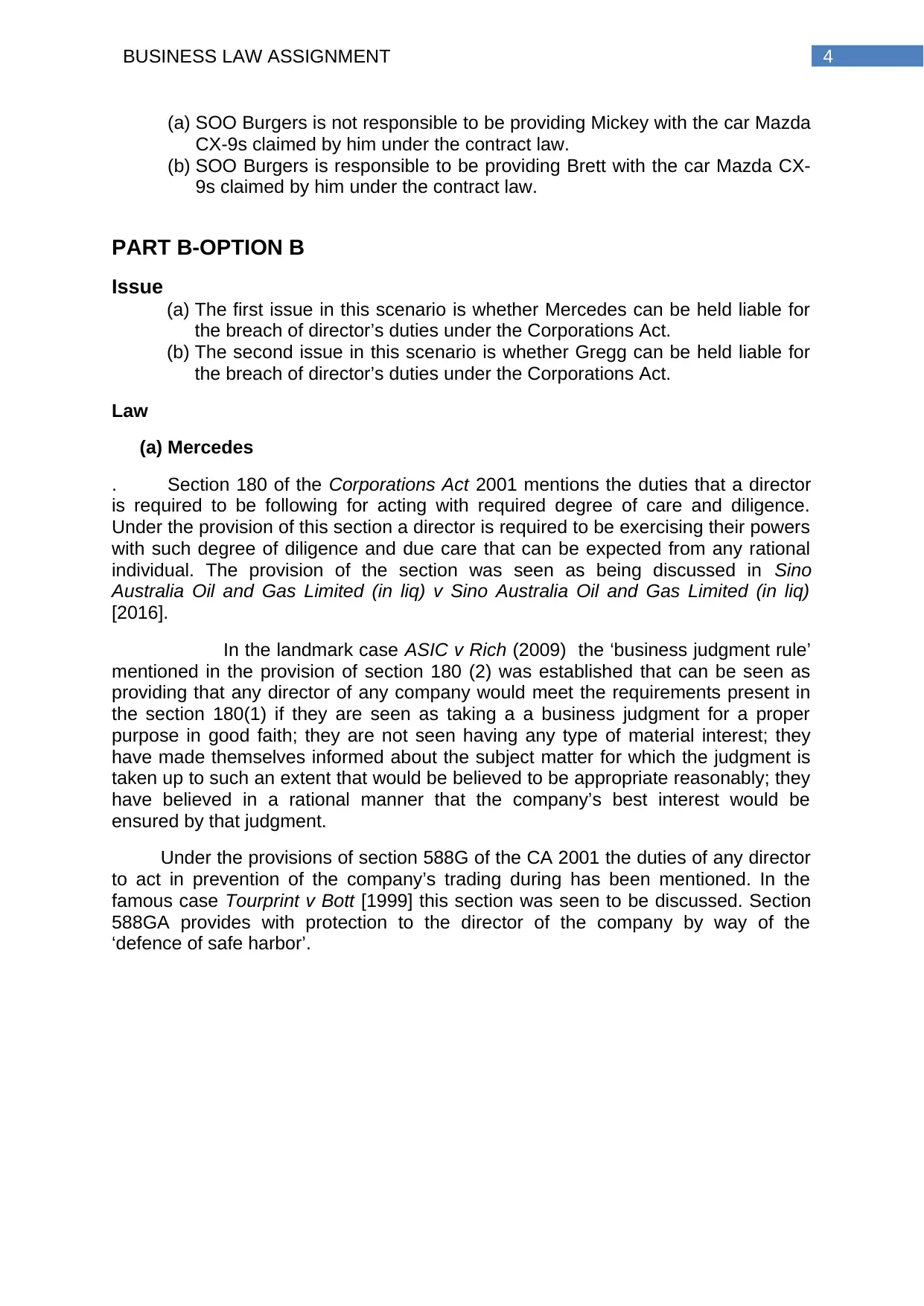
4BUSINESS LAW ASSIGNMENT
(a) SOO Burgers is not responsible to be providing Mickey with the car Mazda
CX-9s claimed by him under the contract law.
(b) SOO Burgers is responsible to be providing Brett with the car Mazda CX-
9s claimed by him under the contract law.
PART B-OPTION B
Issue
(a) The first issue in this scenario is whether Mercedes can be held liable for
the breach of director’s duties under the Corporations Act.
(b) The second issue in this scenario is whether Gregg can be held liable for
the breach of director’s duties under the Corporations Act.
Law
(a) Mercedes
. Section 180 of the Corporations Act 2001 mentions the duties that a director
is required to be following for acting with required degree of care and diligence.
Under the provision of this section a director is required to be exercising their powers
with such degree of diligence and due care that can be expected from any rational
individual. The provision of the section was seen as being discussed in Sino
Australia Oil and Gas Limited (in liq) v Sino Australia Oil and Gas Limited (in liq)
[2016].
In the landmark case ASIC v Rich (2009) the ‘business judgment rule’
mentioned in the provision of section 180 (2) was established that can be seen as
providing that any director of any company would meet the requirements present in
the section 180(1) if they are seen as taking a a business judgment for a proper
purpose in good faith; they are not seen having any type of material interest; they
have made themselves informed about the subject matter for which the judgment is
taken up to such an extent that would be believed to be appropriate reasonably; they
have believed in a rational manner that the company’s best interest would be
ensured by that judgment.
Under the provisions of section 588G of the CA 2001 the duties of any director
to act in prevention of the company’s trading during has been mentioned. In the
famous case Tourprint v Bott [1999] this section was seen to be discussed. Section
588GA provides with protection to the director of the company by way of the
‘defence of safe harbor’.
(a) SOO Burgers is not responsible to be providing Mickey with the car Mazda
CX-9s claimed by him under the contract law.
(b) SOO Burgers is responsible to be providing Brett with the car Mazda CX-
9s claimed by him under the contract law.
PART B-OPTION B
Issue
(a) The first issue in this scenario is whether Mercedes can be held liable for
the breach of director’s duties under the Corporations Act.
(b) The second issue in this scenario is whether Gregg can be held liable for
the breach of director’s duties under the Corporations Act.
Law
(a) Mercedes
. Section 180 of the Corporations Act 2001 mentions the duties that a director
is required to be following for acting with required degree of care and diligence.
Under the provision of this section a director is required to be exercising their powers
with such degree of diligence and due care that can be expected from any rational
individual. The provision of the section was seen as being discussed in Sino
Australia Oil and Gas Limited (in liq) v Sino Australia Oil and Gas Limited (in liq)
[2016].
In the landmark case ASIC v Rich (2009) the ‘business judgment rule’
mentioned in the provision of section 180 (2) was established that can be seen as
providing that any director of any company would meet the requirements present in
the section 180(1) if they are seen as taking a a business judgment for a proper
purpose in good faith; they are not seen having any type of material interest; they
have made themselves informed about the subject matter for which the judgment is
taken up to such an extent that would be believed to be appropriate reasonably; they
have believed in a rational manner that the company’s best interest would be
ensured by that judgment.
Under the provisions of section 588G of the CA 2001 the duties of any director
to act in prevention of the company’s trading during has been mentioned. In the
famous case Tourprint v Bott [1999] this section was seen to be discussed. Section
588GA provides with protection to the director of the company by way of the
‘defence of safe harbor’.
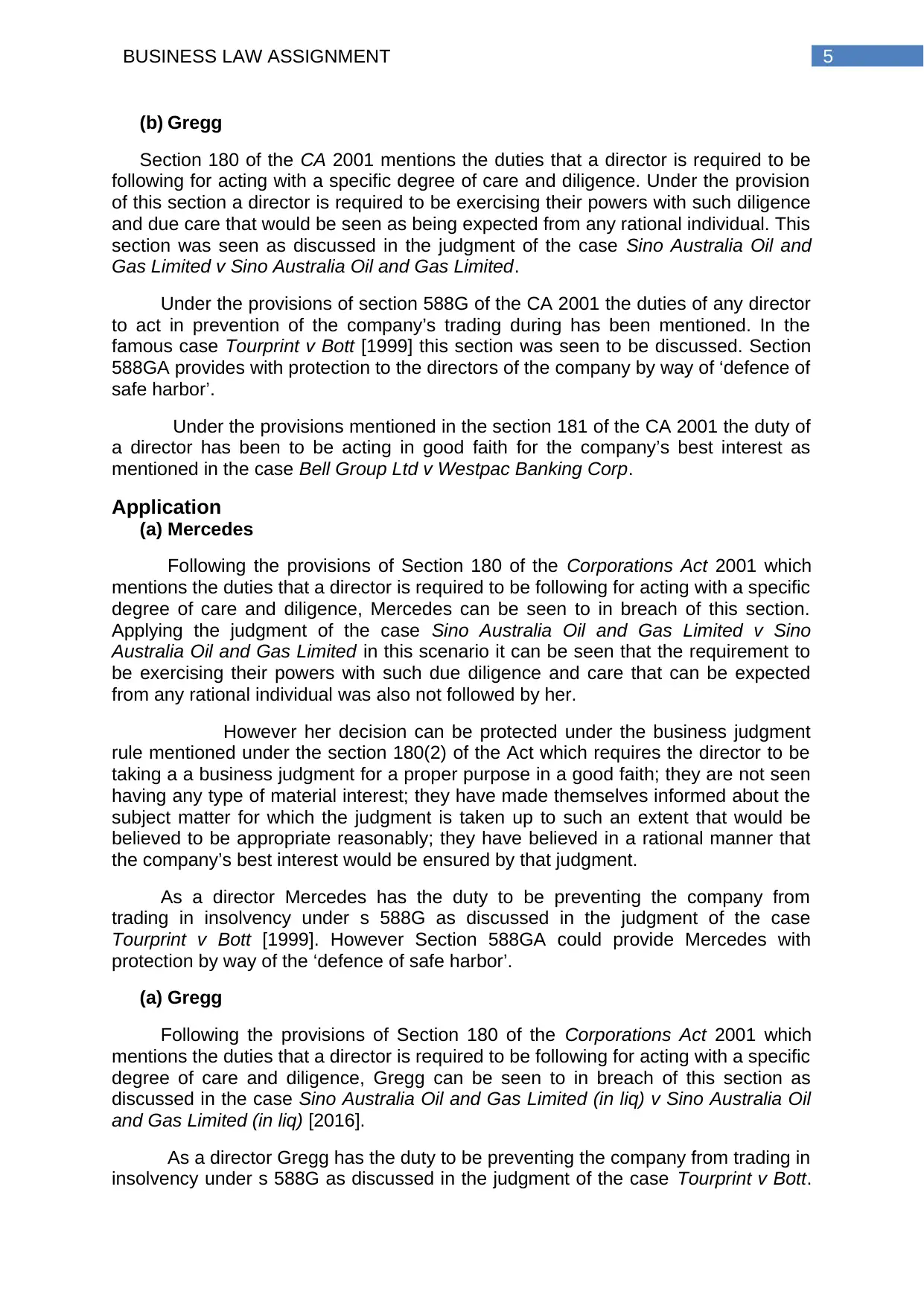
5BUSINESS LAW ASSIGNMENT
(b) Gregg
Section 180 of the CA 2001 mentions the duties that a director is required to be
following for acting with a specific degree of care and diligence. Under the provision
of this section a director is required to be exercising their powers with such diligence
and due care that would be seen as being expected from any rational individual. This
section was seen as discussed in the judgment of the case Sino Australia Oil and
Gas Limited v Sino Australia Oil and Gas Limited.
Under the provisions of section 588G of the CA 2001 the duties of any director
to act in prevention of the company’s trading during has been mentioned. In the
famous case Tourprint v Bott [1999] this section was seen to be discussed. Section
588GA provides with protection to the directors of the company by way of ‘defence of
safe harbor’.
Under the provisions mentioned in the section 181 of the CA 2001 the duty of
a director has been to be acting in good faith for the company’s best interest as
mentioned in the case Bell Group Ltd v Westpac Banking Corp.
Application
(a) Mercedes
Following the provisions of Section 180 of the Corporations Act 2001 which
mentions the duties that a director is required to be following for acting with a specific
degree of care and diligence, Mercedes can be seen to in breach of this section.
Applying the judgment of the case Sino Australia Oil and Gas Limited v Sino
Australia Oil and Gas Limited in this scenario it can be seen that the requirement to
be exercising their powers with such due diligence and care that can be expected
from any rational individual was also not followed by her.
However her decision can be protected under the business judgment
rule mentioned under the section 180(2) of the Act which requires the director to be
taking a a business judgment for a proper purpose in a good faith; they are not seen
having any type of material interest; they have made themselves informed about the
subject matter for which the judgment is taken up to such an extent that would be
believed to be appropriate reasonably; they have believed in a rational manner that
the company’s best interest would be ensured by that judgment.
As a director Mercedes has the duty to be preventing the company from
trading in insolvency under s 588G as discussed in the judgment of the case
Tourprint v Bott [1999]. However Section 588GA could provide Mercedes with
protection by way of the ‘defence of safe harbor’.
(a) Gregg
Following the provisions of Section 180 of the Corporations Act 2001 which
mentions the duties that a director is required to be following for acting with a specific
degree of care and diligence, Gregg can be seen to in breach of this section as
discussed in the case Sino Australia Oil and Gas Limited (in liq) v Sino Australia Oil
and Gas Limited (in liq) [2016].
As a director Gregg has the duty to be preventing the company from trading in
insolvency under s 588G as discussed in the judgment of the case Tourprint v Bott.
(b) Gregg
Section 180 of the CA 2001 mentions the duties that a director is required to be
following for acting with a specific degree of care and diligence. Under the provision
of this section a director is required to be exercising their powers with such diligence
and due care that would be seen as being expected from any rational individual. This
section was seen as discussed in the judgment of the case Sino Australia Oil and
Gas Limited v Sino Australia Oil and Gas Limited.
Under the provisions of section 588G of the CA 2001 the duties of any director
to act in prevention of the company’s trading during has been mentioned. In the
famous case Tourprint v Bott [1999] this section was seen to be discussed. Section
588GA provides with protection to the directors of the company by way of ‘defence of
safe harbor’.
Under the provisions mentioned in the section 181 of the CA 2001 the duty of
a director has been to be acting in good faith for the company’s best interest as
mentioned in the case Bell Group Ltd v Westpac Banking Corp.
Application
(a) Mercedes
Following the provisions of Section 180 of the Corporations Act 2001 which
mentions the duties that a director is required to be following for acting with a specific
degree of care and diligence, Mercedes can be seen to in breach of this section.
Applying the judgment of the case Sino Australia Oil and Gas Limited v Sino
Australia Oil and Gas Limited in this scenario it can be seen that the requirement to
be exercising their powers with such due diligence and care that can be expected
from any rational individual was also not followed by her.
However her decision can be protected under the business judgment
rule mentioned under the section 180(2) of the Act which requires the director to be
taking a a business judgment for a proper purpose in a good faith; they are not seen
having any type of material interest; they have made themselves informed about the
subject matter for which the judgment is taken up to such an extent that would be
believed to be appropriate reasonably; they have believed in a rational manner that
the company’s best interest would be ensured by that judgment.
As a director Mercedes has the duty to be preventing the company from
trading in insolvency under s 588G as discussed in the judgment of the case
Tourprint v Bott [1999]. However Section 588GA could provide Mercedes with
protection by way of the ‘defence of safe harbor’.
(a) Gregg
Following the provisions of Section 180 of the Corporations Act 2001 which
mentions the duties that a director is required to be following for acting with a specific
degree of care and diligence, Gregg can be seen to in breach of this section as
discussed in the case Sino Australia Oil and Gas Limited (in liq) v Sino Australia Oil
and Gas Limited (in liq) [2016].
As a director Gregg has the duty to be preventing the company from trading in
insolvency under s 588G as discussed in the judgment of the case Tourprint v Bott.
⊘ This is a preview!⊘
Do you want full access?
Subscribe today to unlock all pages.

Trusted by 1+ million students worldwide
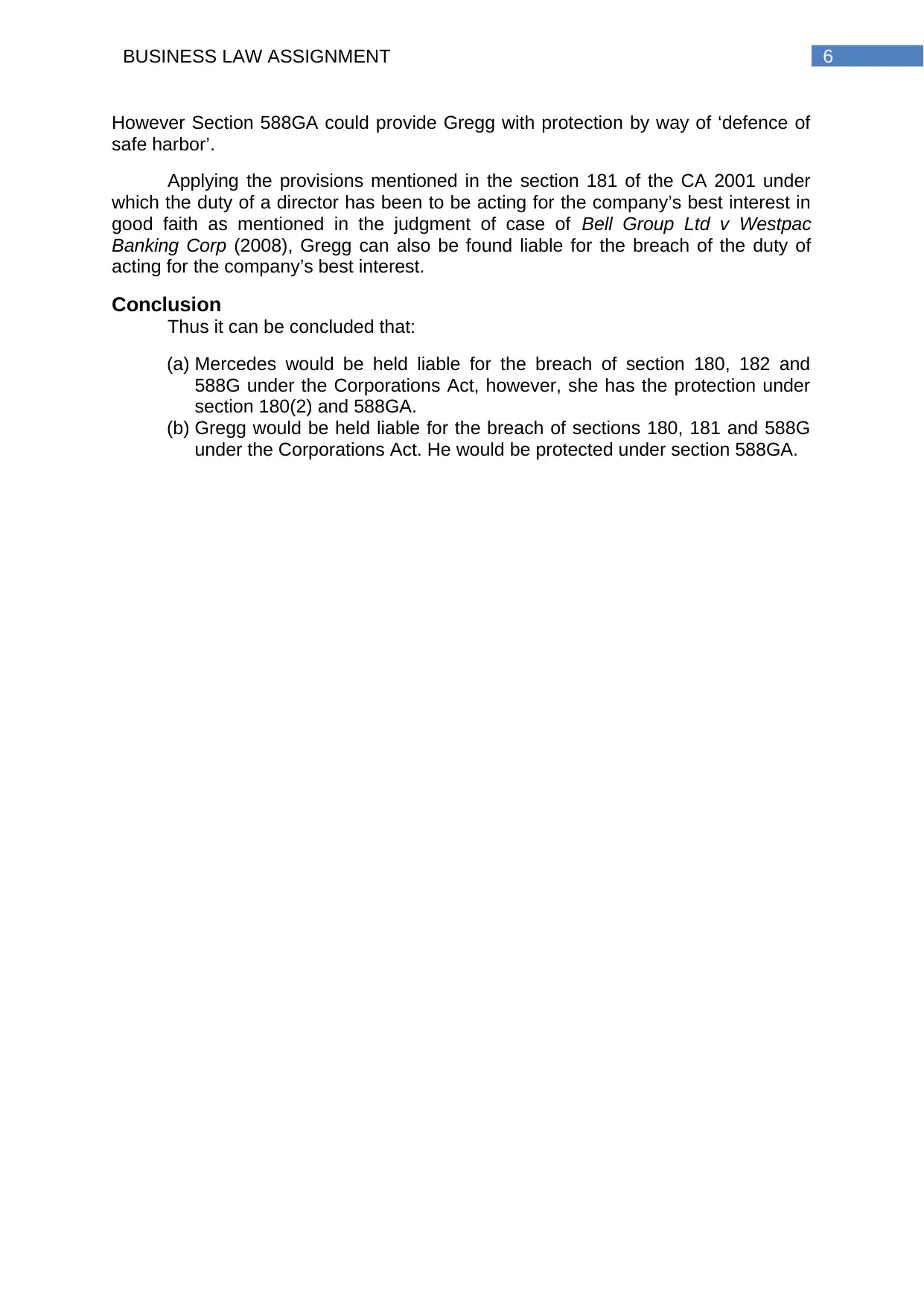
6BUSINESS LAW ASSIGNMENT
However Section 588GA could provide Gregg with protection by way of ‘defence of
safe harbor’.
Applying the provisions mentioned in the section 181 of the CA 2001 under
which the duty of a director has been to be acting for the company’s best interest in
good faith as mentioned in the judgment of case of Bell Group Ltd v Westpac
Banking Corp (2008), Gregg can also be found liable for the breach of the duty of
acting for the company’s best interest.
Conclusion
Thus it can be concluded that:
(a) Mercedes would be held liable for the breach of section 180, 182 and
588G under the Corporations Act, however, she has the protection under
section 180(2) and 588GA.
(b) Gregg would be held liable for the breach of sections 180, 181 and 588G
under the Corporations Act. He would be protected under section 588GA.
However Section 588GA could provide Gregg with protection by way of ‘defence of
safe harbor’.
Applying the provisions mentioned in the section 181 of the CA 2001 under
which the duty of a director has been to be acting for the company’s best interest in
good faith as mentioned in the judgment of case of Bell Group Ltd v Westpac
Banking Corp (2008), Gregg can also be found liable for the breach of the duty of
acting for the company’s best interest.
Conclusion
Thus it can be concluded that:
(a) Mercedes would be held liable for the breach of section 180, 182 and
588G under the Corporations Act, however, she has the protection under
section 180(2) and 588GA.
(b) Gregg would be held liable for the breach of sections 180, 181 and 588G
under the Corporations Act. He would be protected under section 588GA.
Paraphrase This Document
Need a fresh take? Get an instant paraphrase of this document with our AI Paraphraser
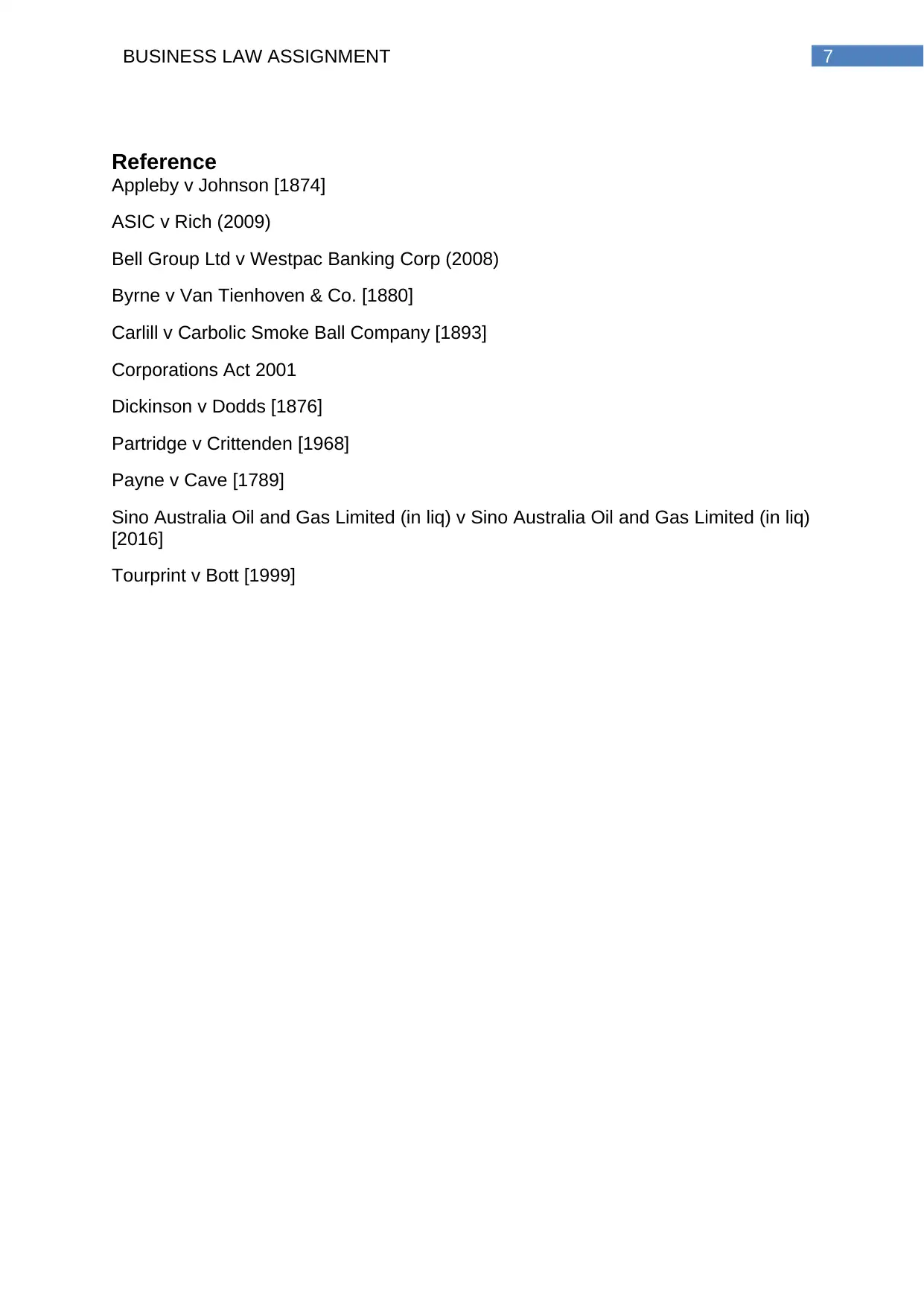
7BUSINESS LAW ASSIGNMENT
Reference
Appleby v Johnson [1874]
ASIC v Rich (2009)
Bell Group Ltd v Westpac Banking Corp (2008)
Byrne v Van Tienhoven & Co. [1880]
Carlill v Carbolic Smoke Ball Company [1893]
Corporations Act 2001
Dickinson v Dodds [1876]
Partridge v Crittenden [1968]
Payne v Cave [1789]
Sino Australia Oil and Gas Limited (in liq) v Sino Australia Oil and Gas Limited (in liq)
[2016]
Tourprint v Bott [1999]
Reference
Appleby v Johnson [1874]
ASIC v Rich (2009)
Bell Group Ltd v Westpac Banking Corp (2008)
Byrne v Van Tienhoven & Co. [1880]
Carlill v Carbolic Smoke Ball Company [1893]
Corporations Act 2001
Dickinson v Dodds [1876]
Partridge v Crittenden [1968]
Payne v Cave [1789]
Sino Australia Oil and Gas Limited (in liq) v Sino Australia Oil and Gas Limited (in liq)
[2016]
Tourprint v Bott [1999]
1 out of 8
Related Documents
Your All-in-One AI-Powered Toolkit for Academic Success.
+13062052269
info@desklib.com
Available 24*7 on WhatsApp / Email
![[object Object]](/_next/static/media/star-bottom.7253800d.svg)
Unlock your academic potential
Copyright © 2020–2026 A2Z Services. All Rights Reserved. Developed and managed by ZUCOL.





